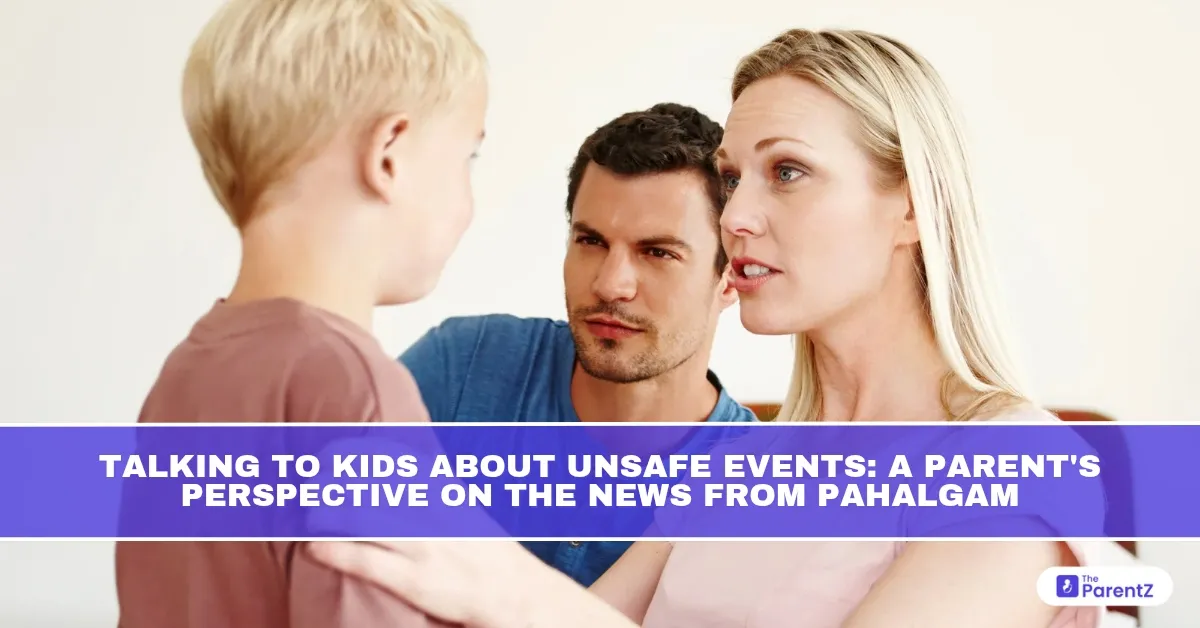The recent terror attack in Pahalgam has left our hearts heavy with grief and sorrow. On April 22, 2025, innocent lives were brutally taken in the beautiful Baisaran meadows—at least 28 people, including tourists from different parts of the country and abroad, lost their lives, and many more were critically injured. Our deepest condolences go out to the families who have suffered unimaginable loss and pain. No words can truly capture the depth of their sorrow, and as a community, we stand with them in this time of mourning.
For parents, this tragic event brings not only sadness but also a deep worry about how to protect and comfort their children in the face of such horror. The news and videos circulating on social media are raw and distressing, and it is almost impossible for children not to come across them. It is more important than ever for parents to gently and openly talk to their kids about what has happened to help them understand, feel safe, and not be overwhelmed by fear or misinformation.
Acknowledge Your Own Feelings First
Before talking to your child, take a moment to recognize your own emotions—fear, sadness, anger, or confusion. Your feelings will influence how you communicate, so being calm and thoughtful helps create a safe space for your child to open up. Remember, it’s okay to share that you are upset, but reassure them that you are there to protect and support them.
Starting the Conversation
The natural parental instinct is to protect children from these harsh realities. However, completely shielding them might leave them unprepared when they inevitably encounter such news on their own, potentially from sources that don't have their best interests at heart.
So, how do we talk about something so terrible with our children?
- Create a Safe and Comfortable Environment: Choose a quiet moment at home where your child feels secure. Let them know that it’s okay to talk about what they have heard or seen. Children may feel scared, confused, or angry, and they need to know their feelings are valid and that they can express them freely.
- Be Honest but Age-Appropriate: We don't need to share graphic details, but honesty builds trust. "Some people did something very wrong and hurt others. Many people are working to help those who are hurt and to keep everyone safe now."
- Encourage Questions and Listen Carefully: Children may have many questions, or sometimes none at all. Let them guide the conversation. Ask gently, “What have you heard about what happened?” or “How do you feel about it?” Listen without interrupting or rushing to fix their feelings. This helps them process the event in their own way.
- Address Their Fears Directly: Children often wonder if they're safe. Reassure them about the distance of the event and the measures in place to protect them. "This happened far from us, and many people are working to make sure it doesn't happen again."
Helping Them Process
The images from Pahalgam are distressing even for adults. For children, they can be overwhelming and frightening. Here's how we can help:
- Validate their feelings: It's okay to feel scared, sad, or confused. Let them know these feelings are normal. "It's okay to feel upset about this. I feel sad, too."
- Limit media exposure: Social media is flooded with videos and images of the attack and its aftermath, which can be very distressing for children. It’s important to monitor and limit their exposure to such content. Encourage them to come to you if they see something upsetting or have questions. This prevents misinformation and fear from growing unchecked.
- Focus on the helpers: Talk about the emergency responders, doctors, and kind strangers who jumped in to help. Mention how the government has set up emergency helplines to support people affected.
If your child shows signs of ongoing fear, anxiety, or sadness that interfere with daily life, consider seeking support from a counselor or child psychologist. Trauma affects children differently, and professional help can guide them through healing.
Moving Forward Together
The Pahalgam attack is a harsh reminder of the dangers that exist in the world, but as parents, we have the power to shield our children from fear by talking openly, honestly, and lovingly. By addressing the issue before they encounter disturbing content on social media or elsewhere, we help them understand the situation without panic and build resilience.
In these moments of pain and uncertainty, our conversations can be a source of comfort and strength for our children. Let’s hold their hands, listen to their hearts, and walk with them through this difficult time, reminding them that they are safe, loved, and never alone.
These conversations will not be easy. You may struggle to find the right words or worry you've said too much or too little.
In these difficult times, children need their parents to be their anchors—not by pretending the storm isn't happening, but by showing them how to weather it together, while honoring the memory of those who have suffered and standing in solidarity with all affected by this tragedy.








Be the first one to comment on this story.